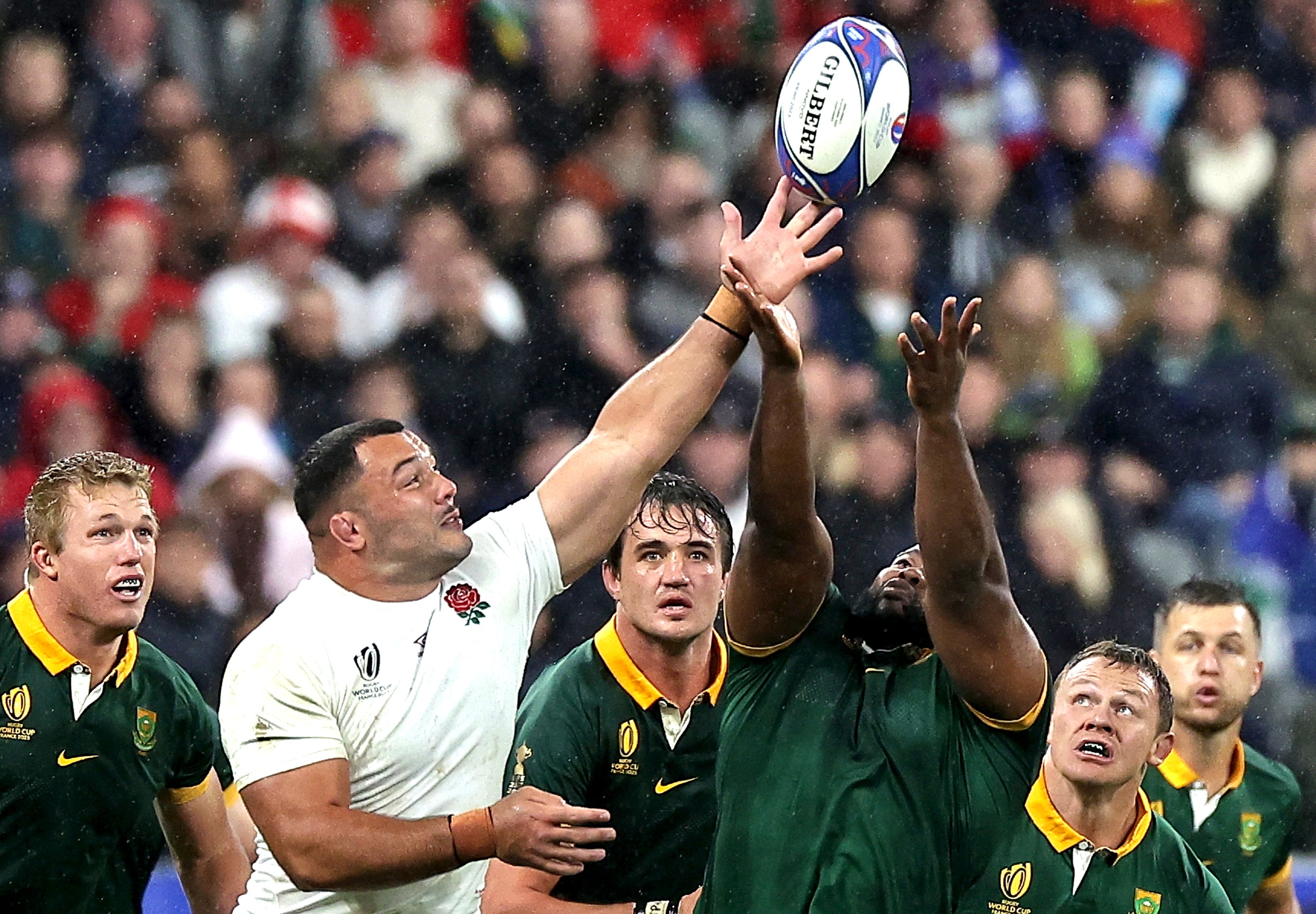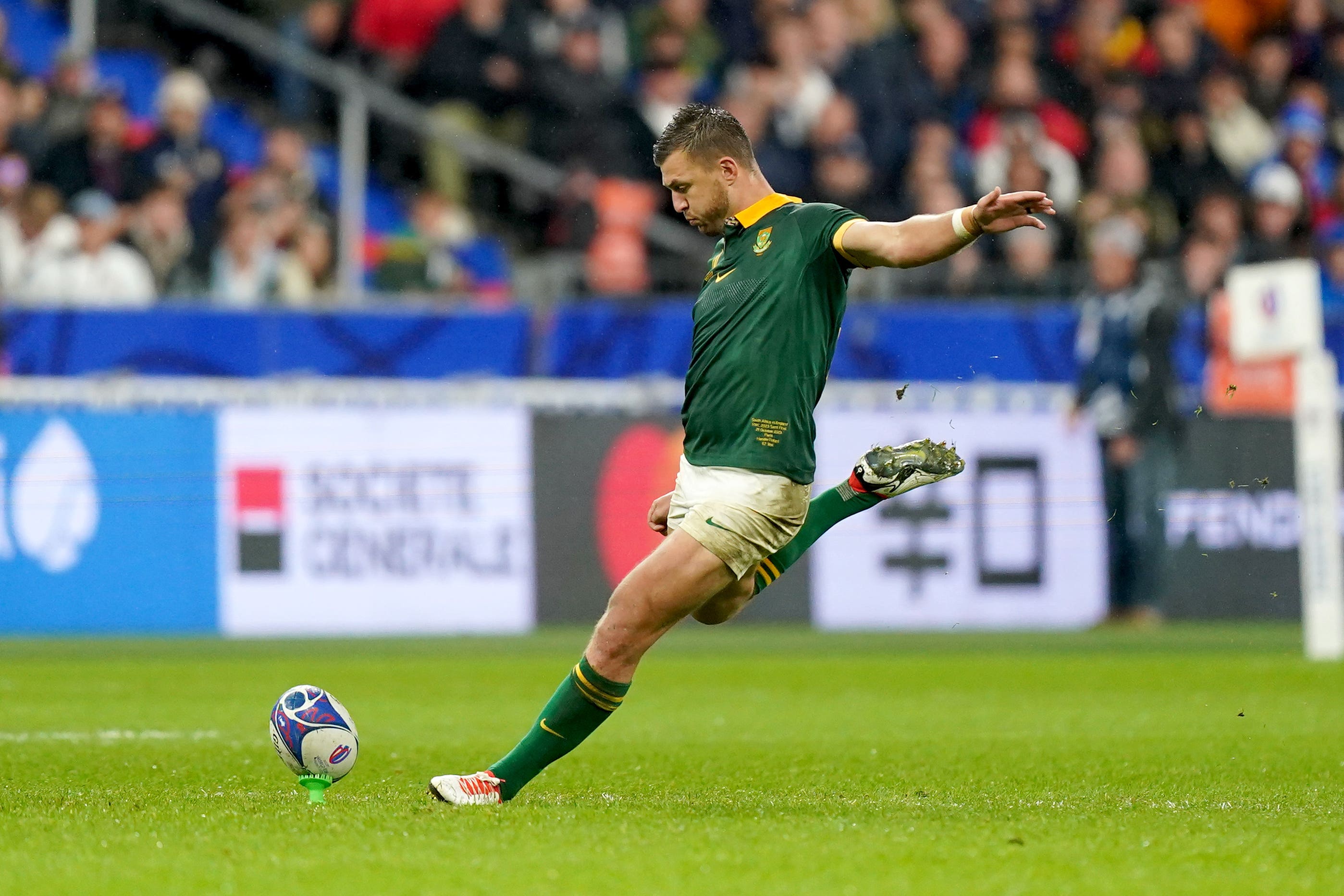‘We are the bomb squad’: How South Africa’s not-so-secret weapon turned Rugby World Cup semi-final
The Springboks came from behind to dramatically beat England in Paris and had their uniquely-styled replacements to thank

Your support helps us to tell the story
From reproductive rights to climate change to Big Tech, The Independent is on the ground when the story is developing. Whether it's investigating the financials of Elon Musk's pro-Trump PAC or producing our latest documentary, 'The A Word', which shines a light on the American women fighting for reproductive rights, we know how important it is to parse out the facts from the messaging.
At such a critical moment in US history, we need reporters on the ground. Your donation allows us to keep sending journalists to speak to both sides of the story.
The Independent is trusted by Americans across the entire political spectrum. And unlike many other quality news outlets, we choose not to lock Americans out of our reporting and analysis with paywalls. We believe quality journalism should be available to everyone, paid for by those who can afford it.
Your support makes all the difference.“We are the bomb squad and we knew we had to play a massive role.” If South Africa’s narrow win over England in the Rugby World Cup semi-final could be summed up in one sentence, then this proclamation from Vincent Koch after the game would probably be it.
When Koch emerged from the replacements on 55 minutes to take the place of starting tighthead prop Frans Malherbe, Owen Farrell had just slotted a drop goal from downtown Paris to give England a 15-6 lead. Nine points may not seem a lot but, with the final quarter of the match beckoning and the rain and wind increasing at the Stade de France, it was a comparatively huge deficit.
Throughout the first few minutes of the second half, the Springboks had more or less emptied their bench as Ox Nche, RG Snyman, Kwagga Smith, Deon Fourie, Faf de Klerk and Willie Le Roux all entered the fray to go alongside the controversial 30th-minute substitution of starting fly half Manie Libbok for Handre Pollard.
With their World Cup title defence hanging by a thread, South Africa trusted their bench and got their reward. Koch and Nche splintered the previously effective English scrum, Snyman burrowed his way across the line for the game’s only try and Pollard nervelessly converted tricky kicks to complete the hardest-fought of turnarounds – 10 unanswered points, a 16-15 win and a date with the All Blacks in another World Cup final next Saturday.
Of the various phrases rugby has adopted over the years to describe those players in the matchday squad but not in the starting line-up – from the traditional “replacements” and the football-ised “substitutes” through to the Eddie Jones-preferred ‘finishers’, the slightly patronising “impact players” and the frankly ludicrous “game-changers” adopted by Harlequins during the Paul Gustard era – none has captured the imagination quite like South Africa’s “bomb squad”.
It doesn’t matter if you think it’s a slightly self-serving and faintly ridiculous term, the players fully buy into the ethos of what it stands for. The intensity and physicality that generation after generation of Springbok has prided themselves on is summed up by this two-word mantra.
“Each person knows exactly his role in the team, whether you’re starting or in the bomb squad,” explained Koch. “When we created the bomb squad, we knew exactly what our job is. The starters start the whole process and it’s for us to come and finish it.
“All the players on the bomb squad are very excited to make a massive difference in the game.”

And against England, when the chips were down, they realised they needed to step up more than ever.
“The bomb squad always stands for energy,” added Koch. “We needed to create a nice vibe. Putting the replacements on a bit earlier helped the boys to start to bring that energy and lift up the spirit and bring a massive work-rate.”
Where South Africa’s replacements thrived, perhaps England’s faltered just a touch.
The English gameplan, devised by Steve Borthwick and perfectly executed by the players for the windy and rainy Parisian conditions, relied upon relentless kicking, winning the subsequent aerial battle, slowing the game down and dominating the set-piece. Maybe then, they could escape with a win against an objectively superior team.
They kicked 93 per cent of possession away (the highest percentage of the tournament), had an average ruck speed of 6.73s (the slowest of the tournament) and had zero linebreaks (the only team to do so in a game at this tournament). They disrupted South African lineouts, turned over multiple mauls and Borthwick’s decision to play his two strongest scrummaging props – Dan Cole and Joe Marler – from the start earned them scrum parity and redemption from the disaster in that facet during the 2019 World Cup final.

This is a Springboks side that pride themselves on their dominance up front, as shown by opting for a scrum after calling a mark in their own 22 during the quarter-final victory over France. Of course, they won a penalty from it. Yet England were holding their own during those engagements, even thriving, and most importantly winning on the scoreboard.
But the innate problem with starting your best scrummagers came to fruition in the second half. Replacement props Ellis Genge and Kyle Sinckler are far more dynamic around the park and more destructive carriers than their veteran counterparts but, with England showing no desire to run any plays more than two metres either side of the previous breakdown, those skills were negated once they came on for Marler and Cole.
Instead, their inferior scrummaging was brutally exposed by a fired-up Koch and Nche, who turned parity into Springbok dominance. They won two scrums against the head, including a vital one at 15-6 down on their own line, and engineered multiple penalties on their own feed, including the most vital of all – on halfway, with 77 minutes on the clock and England leading 15-13. Pollard banged over the long kick and the rest was history.

Nche was coy when asked in the mixed zone after the game what had made the difference at scrum-time in the final quarter and how he bested his opposite number, Sinckler.
“That is the dark arts,” he smiled. “It is hard to explain to you. We had a plan for that. We knew what we were trying to achieve.
“They have had a great scrum for the competition and a great hit. Our focus was surviving that and applying pressure. Our mentality for every scrum is to get a penalty if we can. If they do survive, we play out the back and get into our shape.”
The “dark arts” ultimately won the day, South Africa survived a second straight one-point knockout match and must now plan how to overcome the All Blacks in a battle to be the first side to win four men’s Rugby World Cups.
Luckily, they have a not-so-secret weapon. “We are the bomb squad.”
Join our commenting forum
Join thought-provoking conversations, follow other Independent readers and see their replies
Comments